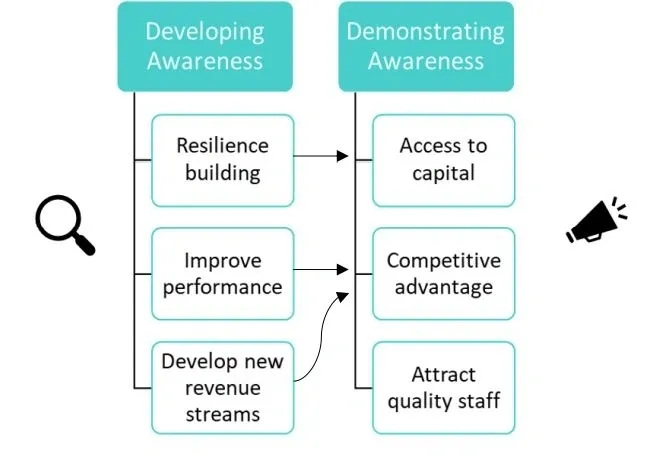Benefits of sustainability reporting
Developing and demonstrating awareness through the process of generating sustainability reports has multiple company-wide benefits.
The process of producing a robust sustainability report is no mean feat. It requires large amounts of data collection, collaboration between all departments (ideally with executive level buy-in) and close attention to the stipulations of the chosen reporting framework. There are two key outcomes of going through the process however, which each have their own unique benefits and together place sustainability reporting well within the realm of opportunity rather than burden.
Outcome no. 1: Developing awareness
An ESG report requires going through your business with a fine-tooth comb, which furnishes the organisation with a wholistic picture of their environmental, social and governance context. The benefits of this are manifold and include resilience building, in which an awareness of existing and potential social or environmental risks means you design systems which are as resilient as possible; performance improvement, whereby efficiencies are found, or processes can be redesigned to be more effective; and developing new revenue streams, whereby an increased awareness of sustainability issues shines a light on product or service gaps in the market.
Outcome no. 2: Demonstrating awareness
Once a report is produced, there are advantages to be gained by sharing its findings, almost irrespective of what they might be. Firstly, demonstrating awareness of your financial materiality and the ways in which you are actively seeking to mitigate risk and minimise exposure increases access to capital, which is actively seeking future-proofed, ‘sustainable’ investments. Secondly, as ESG reporting becomes increasingly mandated, the more thorough and sophisticated reports will help companies stand out against their competition, both for capital and customers. Thirdly, there is potential for ‘The Great Resignation’ and increasing climate awareness amongst professionals to converge, allowing for companies with strong sustainability credentials to attract high-performing professionals who newly committed to having their personal and workplace values to align. As far back as 2019 the Institute of Environmental Management and Assessment found that amongst surveyed British office workers, a quarter would turn down a job at an organisation with a poor environmental record, and in another survey, found that 86% of people survey born between the early 80’s and mid 2000s would remain at a workplace longer if it reported on how it was lowering its environmental footprint.

Read more about Sustainable Business Planning.
To discuss your sustainability reporting and planning requirements, contact us.
Better Planning. Better Planet.


